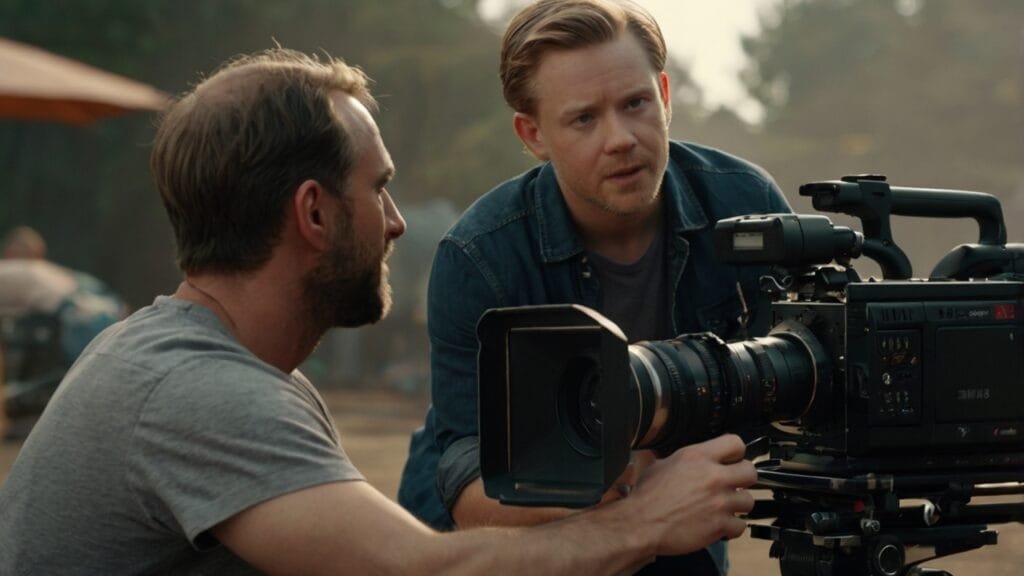The right agent isn’t just a name on a business card. They’re your advocate, negotiator, and the person who’ll help you crack the code of Hollywood (or your local acting scene). But let’s be real, finding one can feel as intimidating as auditioning for a lead role without a script.
No worries, though! This guide will walk you through the steps to secure an acting agent and build those oh-so-important industry relationships.
The Role of an Acting Agent
Before you start emailing agents or sliding into their DMs (please don’t), it’s important to know exactly what they do and why you need one in the first place.
Why You Need an Acting Agent
Think of an acting agent as your career GPS. They connect you with casting directors, producers, and other decision-makers. Plus, many auditions are agent-access-only these days. But their job isn’t just about getting you into rooms.
A great agent will negotiate your contracts, steer you toward roles that boost your career, and help you dodge sketchy deals. They’re like a mix of a career coach and a protective older sibling – always looking out for you and your potential.
What to Expect From Your Agent
A good agent does more than just find you auditions – they’re like your career strategist. They’ll pitch you for roles that fit, talk to casting directors, and hammer out contracts to make sure you’re getting paid what you deserve.
On top of that, they’re a great resource for career advice. Whether it’s pointing you toward top-notch acting classes, helping polish your headshots and resume, or even giving tips to level up your social media game, a solid agent is in your corner to help you shine.
Think of your agent as your advocate. They work on commission, usually taking 10-20% of what you earn from the gigs they land for you.
Knowing how an agent operates can be a game-changer. It sets you up to find the right fit and creates a strong foundation for a successful partnership – and ultimately, a thriving acting career.
Preparing to Approach Acting Agents

Now that you know what an acting agent can do for you, let’s talk about how to get one. Spoiler: It starts with preparation.
Polish Your Acting Resume
Your acting resume is your first impression, so make it count. Keep it to one page and include your acting credits, training, special skills, and physical stats (like height and eye color). And don’t forget clear contact details – agents don’t have time to play detective.
Most importantly, keep it honest. Claiming you’re fluent in French only to bomb a Parisian audition is not the vibe.
Need help crafting the perfect resume? We’ve got a step-by-step guide just for you.
Build an Online Presence
Building a solid social media presence is another great way to catch the eye of potential agents and agencies – especially the good ones. If you’re active on Instagram, Twitter, or TikTok, make sure your profiles are polished and professional. Remember, everything you post online can either open doors or shut them, so keep it clean and career-focused.
You may also want to create a personal website to showcase your acting career. Platforms like Wix and Squarespace make it super easy with ready-made templates that you can tweak to highlight your unique talents. Think of your website as your digital portfolio. Here are some essentials you can include:
- Resume: Dedicate a page to it, and don’t forget to include a downloadable PDF link for anyone interested.
- Headshots: Show off your range – let people see all the characters you can bring to life.
- Clips/Reel: Let visitors experience your talent firsthand. Include acting reels, voiceover samples, or even dance footage – whatever fits your skills and looks professional.
- Bio: Share your story! Let people get to know who you are as an artist and what makes you stand out.
- Blog: Keep things fresh by posting updates on gigs, classes, or any exciting career news. It’s a great way to stay relevant and connected.
A professional online presence doesn’t just look good – it shows agents you’re serious about your craft and ready to level up.
The Importance of Headshots and Reels
Your headshots and reels are your calling card – they’re the first impression you make, so quality is everything. Are yours good enough to grab the attention of the agents and managers you’d actually want to work with?
For headshots, invest in a professional photographer who knows the industry inside and out. If you can, bring in a pro hair and makeup artist too. These experts will make sure you look your best, so you can focus on nailing the shoot without any added stress.
As for reels, they’re your chance to showcase your skills and give agents a taste of your talent. A great reel doesn’t just impress – it leaves them wanting more.
Remember, it’s not just about finding an acting agent – it’s about finding the right one for you.
Researching Potential Agents

Take your time with your research – finding the right agent is all about alignment. Look for talent agents and agencies that match your acting style, career goals, and current experience level. For instance, if you’re not interested in stage work, skip agencies that only represent theater actors. If you’re new to the industry, chasing top-tier Hollywood agents might not be the best use of your energy.
Start with tools like SAG-AFTRA’s franchised agent list – t’s a goldmine for finding legitimate agents and agencies. Dig into submission guidelines and get to know their client roster. Ask yourself:
- How many clients do they handle?
- Are their clients booking roles and finding success?
- Do they specialize in actors like you – whether it’s film, stand-up, modeling, or something else?
IMDb is another great resource. It’s packed with industry info on agents, managers, and even casting directors.
Stay plugged into the acting world by reading industry publications like Deadline, Hollywood Reporter, Variety, and Indiewire. These can clue you in on casting news, agent updates, and trends.
Don’t forget to check their social media. Is their website polished? Do they celebrate client wins on Instagram? Have they shared industry advice through Q&As or YouTube videos? A quick Google search can tell you a lot.
Lastly, lean on your network. Talk to friends in the business. Do they know these agents? Have they worked with certain agencies? Any glowing recommendations – or red flags – to share? Sometimes, word of mouth can be just as valuable as online research.
Networking and Industry Events

Networking is a must in the entertainment world, especially when you’re on the hunt for an agent. Industry events are goldmines for connecting with acting agents, casting directors, and fellow actors. Make it a point to show up at acting classes, workshops, panel discussions, and film festivals – they’re not just learning opportunities but also great places to meet the right people.
Don’t overlook the connections your acting coaches and teachers might have. These pros often have solid industry contacts and can give you valuable word-of-mouth referrals. But here’s the catch – keep it professional, even in class. You want to leave the kind of impression that makes them excited to recommend you!
Contacting Acting Agents
YOnce you’ve gathered your list of potential acting agents and their contact info, it’s time to take the next step – reaching out!
Crafting Your Pitch
Your pitch or cover letter should strike the perfect balance between personal and professional. Think:
- Short
- Snappy
- Memorable
Here’s what it needs to cover:
- Who you are as an actor: Highlight your strengths, the types of characters you’re perfect for, and any recent career wins.
- Why you’re reaching out: Show you’ve done your homework by explaining why you think they’d be a great fit for you.
- Gratitude: Always thank them for their time and consideration.
Before hitting send, double-check everything for typos or mistakes. A polished, error-free pitch makes for a much stronger first impression!
Email Etiquette and Follow-Ups
When emailing acting agents, always keep your tone polite and respectful. It’s fine to let your personality shine – after all, you’re your own brand – but keep it professional. A light, appropriate joke? Sure. But avoid being overly casual or wasting their time. Get straight to the point – this is a pitch, not a novel.
If you don’t hear back right away, don’t sweat it. Acting agencies get flooded with submissions. A polite follow-up after about a week is totally fine. Patience and professionalism go a long way in this business.
What to Include in Your Submission Package
Your submission package should include:
- Demo reel: A polished reel showcasing your best work.
- Acting resume: Highlight your experience and skills.
- Headshot: A professional, high-quality photo.
- Cover letter: This is your email pitch, so make it count.
If you have a professional social media presence, include links – it can boost your chances of a response. Just make sure your profiles are polished and relevant to your career.
The Meeting Process

A good agent will want to meet face-to-face before signing you, so treat this meeting as seriously as you did your research and pitch.
Be prepared to talk about your goals, past experience, training, and what makes you stand out as an actor. This is your chance to pitch yourself in person, so bring the same energy and confidence you’d use on stage or set.
Also, have a couple of monologues in your back pocket, just in case. Many agents might ask you to perform or even do a cold read. Be warmed up and ready to adapt – if they give you a note, take it seriously and show them you can apply feedback. Legit agents will evaluate not just your current skills but your potential to book roles and impress casting directors.
Discussing Your Career Goals and Expectations
Remember, the agent-client relationship is a partnership. While they’re determining if you’re a good fit for their roster, you should also assess whether they align with your goals. Here are some key topics to cover:
- Contracts: How do their contracts work?
- Commission: What percentage do they take from your pay?
- Communication: How often and in what ways do they stay in touch with their clients?
- Auditions: What kind of opportunities do they typically secure for their actors?
- Client Load: How many actors do they currently represent?
- Vision: How do they see your career path unfolding, and how would they pitch you to casting directors?
This is your opportunity to ensure they’re as invested in your success as you are. The right agent should feel like a partner who genuinely believes in your potential.
Contract Negotiation and Signing
Getting an acting agent is just the start – the next step is making sure you understand the contract that seals the deal.
An agency contract lays out the terms of your relationship with the agent, covering things like their responsibilities, commission rates, and other crucial details. It may also lock in an exclusivity agreement, meaning you can’t work with other agents during the contract period.
What to Look For in a Contract
When you’re reviewing a potential agent’s contract, there are a few key things you need to pay close attention to:
- Agent Responsibilities: Ensure the contract clearly outlines what the agent will be doing for you, like submitting you for roles, handling casting calls, and so on.
- Termination and Extension: Be sure you understand the terms for ending or extending the contract. Watch out for exclusivity clauses that could prevent you from seeking other representation, which might not be in your best interest.
- Commission Rates: These should be clearly stated. Legitimate agents make money only when you do, so if an agent asks for upfront fees, that’s a huge red flag – they’re likely a scam.
If anything feels unclear or if you have doubts about any part of the contract, don’t hesitate to reach out to trusted fellow actors or industry pros for advice. You’ve got to protect your career from the get-go!

Conclusion
Landing an acting agent isn’t just about getting representation – it’s about finding the right partner for your career. So take your time, do your homework, and trust the process. With the right agent by your side, the sky’s the limit.
Now, go out there and shine!





